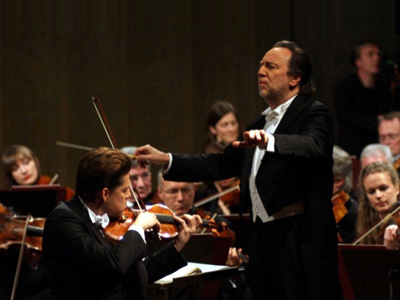
By ANDREW POWELL
Published: March 6, 2015
MUNICH — Julian Rachlin’s ebullient, craggy, not so lyrical reading of Tchaikovsky’s Violin Concerto held listeners in rapt attention Feb. 17 here at the Gasteig. His tone, rich and glowing, illuminated this view of the essentially blissful score (1878), as did the occasional wabi-sabi rasp or squeal, and his bold rhythmic emphases brought logic to the outer movements. At the same time it was hard to ignore what was happening in the accompaniment. The Leipzig Gewandhaus Orchestra, midway through a lengthy E.U. tour, sounded lush and unanimous of purpose, with fine dynamic shadings and impeccable, apparently instinctive, balances. For diverse reasons — newness of leadership, a technical orientation, artistic chaos — the top Munich orchestras (BStO, BRSO, MPhil) do not currently play this way. More fascinating still was the outward ease with which long-serving Kapellmeister Riccardo Chailly guided the musicians, freely focusing on the soloist. (They are pictured at the Gewandhaus in January.)
The Saxons’ collegiality worked comparable wonders on the second half of this MünchenMusik concert, in Rachmaninoff’s Second Symphony (1907). Chailly animated the sprawling canvas on the basis of the strings, just the opposite of fellow Milanese Gianandrea Noseda’s approach back in November, creating an often voluptuous, blended sound. He obtained eloquent woodwind phrasing without nursing every exposed woodwind line. The brass as a section generally held back, or performed in keen awareness of a complete sound picture. In the percussive and staccato string passages of the scherzo-like second movement, Allegro molto, Chailly enforced a crisp, handsomely contrasted Modernist perspective. If the symphony unfolded with less overt drama than under Noseda, its ingenuity and expressive range came across more fully in this performance. And yes, it sounded more German than Russian.
Photo © Alexander Böhm
Related posts:
Russians Disappoint
Trifonov’s Rach 3 Cocktail
Plush Strings of Luxembourg
Rechenberg on Dupré’s Chemin
Volodos the German Romantic
